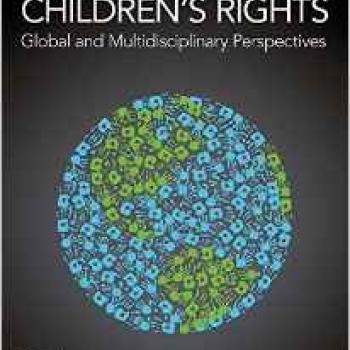Publication Information

With contributions from a wide range of international scholars, the Handbook of Children’s Rights;Global and Multidisciplinary Perspectives brings together research, theory, and practice from diverse perspectives on children’s rights. This volume constitutes a comprehensive treatment of critical perspectives concerning children’s rights in their various forms. Its contributions address some of the major scholarly tensions and policy debates comprising the current discourse on children’s rights, including the best interests of the child, evolving capacities of the child, states’ rights versus children’s rights, rights of children versus parental or family rights, children as citizens, children’s rights versus children’s responsibilities, and balancing protection and participation. In addition to its multidisciplinary focus, the handbook includes perspectives from social science domains in which children’s rights scholarship has evolved largely independently due to distinct and seemingly competing assumptions and disciplinary approaches (e.g., childhood studies, developmental psychology, sociology of childhood, anthropology, and political science). The handbook also brings together diverse methodological approaches to the study of children’s rights, including both quantitative and qualitative perspectives, and policy analysis.
Chapter 8, by Virginia Morrow and Kirrily Pells, discusses children’s rights from a sociological perspective. The chapter starts by defining the discipline of sociology, then briefly discusses rights (and some of problems with current conceptualisations of right) within contemporary legal and political discourse. The authors propose that a sociological approach helps to advance understandings of why rights can be difficult to realise. They describe the development of the sub-discipline of the sociology of childhood, and its potential contribution to policy and practice with respect to children’s rights, highlighting the importance of research that is based on children’s experiences. Using Young Lives research findings, the second part of the chapter examines the intersections of poverty and children’s work in India, to illustrate how sociological approaches can bring ‘rights’ into the debates about child labour in a useful way.
Reference
Virginia Morrow and Kirrily Pells (2016), 'Sociological Approaches to Children’s Rights' chapter in Handbook of Children's Rights: Global and Multidisciplinary Perspectives edited by Martin D. Ruck, Michele Peterson-Badali and Michael Freeman, Routledge.

With contributions from a wide range of international scholars, the Handbook of Children’s Rights;Global and Multidisciplinary Perspectives brings together research, theory, and practice from diverse perspectives on children’s rights. This volume constitutes a comprehensive treatment of critical perspectives concerning children’s rights in their various forms. Its contributions address some of the major scholarly tensions and policy debates comprising the current discourse on children’s rights, including the best interests of the child, evolving capacities of the child, states’ rights versus children’s rights, rights of children versus parental or family rights, children as citizens, children’s rights versus children’s responsibilities, and balancing protection and participation. In addition to its multidisciplinary focus, the handbook includes perspectives from social science domains in which children’s rights scholarship has evolved largely independently due to distinct and seemingly competing assumptions and disciplinary approaches (e.g., childhood studies, developmental psychology, sociology of childhood, anthropology, and political science). The handbook also brings together diverse methodological approaches to the study of children’s rights, including both quantitative and qualitative perspectives, and policy analysis.
Chapter 8, by Virginia Morrow and Kirrily Pells, discusses children’s rights from a sociological perspective. The chapter starts by defining the discipline of sociology, then briefly discusses rights (and some of problems with current conceptualisations of right) within contemporary legal and political discourse. The authors propose that a sociological approach helps to advance understandings of why rights can be difficult to realise. They describe the development of the sub-discipline of the sociology of childhood, and its potential contribution to policy and practice with respect to children’s rights, highlighting the importance of research that is based on children’s experiences. Using Young Lives research findings, the second part of the chapter examines the intersections of poverty and children’s work in India, to illustrate how sociological approaches can bring ‘rights’ into the debates about child labour in a useful way.
Reference
Virginia Morrow and Kirrily Pells (2016), 'Sociological Approaches to Children’s Rights' chapter in Handbook of Children's Rights: Global and Multidisciplinary Perspectives edited by Martin D. Ruck, Michele Peterson-Badali and Michael Freeman, Routledge.

